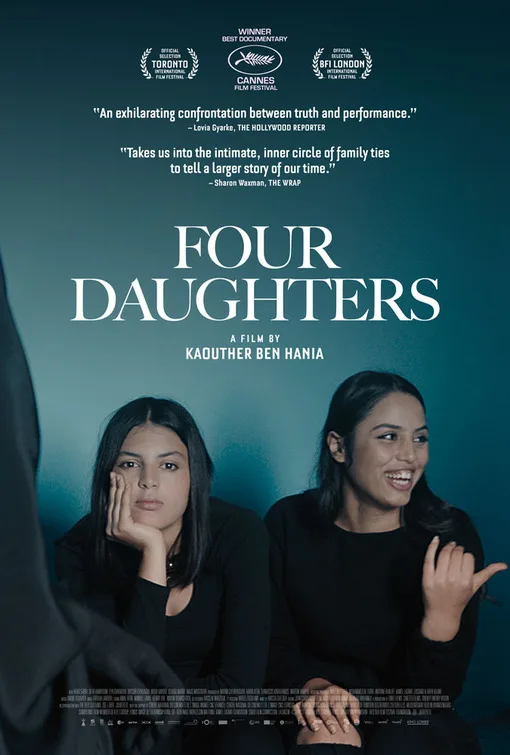The bond of women, especially those in a family unit, is a testament to shared experience. The influence of what it means to walk the world as a woman and to be raised under a roof where the patriarchal and misogynistic influences are experienced identically is what governs the link of sisterhood. While the title of Kaouther Ben Hania’s documentary “Four Daughters” hints at a centrality based in motherhood, it equally examines where the splits in sisterhood occur. The documentary’s true base is that in a home full of women habitually living under the same circumstances, coming of age can be a soul-shaking experience, and family bonds are not always matched to the influences of religious or political dogma.
Olfa Hamrouni has four daughters: Eya, Tayssir, Ghofrane, and Rahma. However, the two eldest, Ghofrane and Rahma, disappeared from their home years ago, radicalized to run away and join ISIS. As Olfa and her youngest two daughters recount the memories of their lives before and after they left, they simultaneously unpack the consequences of where their femininity meets culture. They dissect the worlds and histories that have built them and bring to the forefront of their minds the subconscious yearning for all women to experience power.
Olfa, Eya, and Tayssir are around to tell their side of the story. Ghofrane and Rahma are not, so two actresses, Ichraq Matar and Nour Karoui, respectively, fill their space in the film. They act as inserts in reenactments of sisterly moments, embodying the space they’ve left behind in the present by taking on the depictions of their memory.
Though their presence as actors is not forgotten, a by-proxy bond via the sharing of trauma makes their inclusion effective. When they enter the room to be introduced, the sisters immediately know who will portray each sister, and Olfa is moved to tears. Memories of laying in bed together, playing with each other’s hair, and running the gamut of sisterly conversations, like first periods, puberty tales, and boy gossip, feel utterly genuine. It’s a womanly bond playing as a sisterly bond, but the artifice enhances the authenticity of the film’s emotional core. However, the imbalance of impact among the women leaves a lingering question: at what emotional cost are these actors participating?
Actress Hend Sabry is Olfa’s insert, stepping into the story to reenact memories too painful for Olfa herself to embody. Yet many times, when Sabry is performing, Olfa is visible in the background—an omnipresent force in her fictionalized depiction, even stepping in to correct how it’s being told. “Four Daughters” prioritizes empowering its women to take ownership of telling their story while also allowing its actors to participate in it. Sabry will ask questions, challenge Olfa’s iron fist, and even call her out for enforcing certain misogynistic, patriarchal social policies in raising her daughters.
What’s difficult to measure is the ethics of these moments. How much personal critique is permitted as these women bear their greatest traumas? When do questions become judgments? And on the other end, how much emotional weight are the actors expected to take on? In a particularly uncomfortable moment, actor Majd Mastoura, who depicts each male figure in the women’s lives, becomes so overwhelmed that he stops a scene and refuses to pick it back up. Eya, upset, relays that it’s his job as an actor to run the lines, that this isn’t his trauma, and that he should come back and finish the scene.
While these meta-reenactments are the linchpin of “Four Daughters,” they are inherently one-sided, and the trust between performers is limited by the subjects’ desire to have their stories told or reconstructed by their own means. This throws reliability into question and morality, as the accuracy of retellings and the respect between actor and subject are muddled. The more foundational aspects of documentary filmmaking, be it the talking heads style or archival footage found later on, is the support system needed to make it all work. Ben Hania’s emotional eye is beautifully tethered to her analytical capabilities, and “Four Daughters” is a triumph of layered storytelling, even when its structure’s fairness is questioned.
The bulk of the film shows Olfa, Eya, and Tayssir bearing a broad spectrum of emotions: nostalgia and fondness, despair, indignance, and anger. For the most part, while the actors engage, they discuss how they’ve been trained in their craft not to take on the trauma of their roles. This doesn’t stop them from sharing tears, embraces, or knowing glances of discomfort. It’s apparent that, especially for the sisters, making this film is therapeutic. Through reenactments, they say what they wish they’d said, relive moments far lost and longed for, and use a voice their younger selves had yet to develop. “Four Daughters” is the story of estrangement, reckoning, and catharsis.
There is no villainization, only the considerate narrative care to portray each of the women as whole people, driven to varying degrees of severance from the family principles by various authorities. The generational implications are equally moving, from Olfa’s often oppressive traditionalism to Rahma and Gohfrane’s extremism and Tayssir and Eya’s more modern feminist sentiments. As Olfa and the sisters give perspective on their shared trauma and heartbreak and discuss the underlying principles of it with each other and the actresses, what ensues is not simply the story of a family but a tour de force examination of women’s place in the world and the costs of how they choose to cope with it.
Now playing in theaters.




















